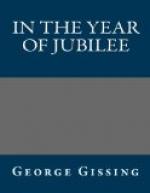All seemed lost. Nancy was silent in despair. But Mary faced the perilous juncture, and, to all appearances, averted catastrophe. She dressed herself, and went straight to the hotel where Crewe had put up, and where he awaited an answer. Having made known who she was, she delivered a verbal message: Miss. Lord was not well enough to see any one to-day, and, in any case, she could not have received Mr Crewe; she begged him to pardon her; before long, they might perhaps meet in London, but, for her own part, she wished Mr. Crewe would learn to regard her as a stranger. Of course there followed a dialogue; and Mary, seeming to speak with all freedom, convinced Crewe that his attempt to gain an interview was quite hopeless. She gave him much information concerning her mistress—none of it false, but all misleading—and in the end had to resist an offer of gold coins, pressed upon her as a bribe for her good word with Nancy.
The question was—had Crewe been content to leave Falmouth without making inquiries of other people? To a man of his experience, nothing was easier than such investigation. But, with other grounds of anxiety, this had ceased to disturb Nancy’s mind. Practically, she lived as though all danger were at an end. The task immediately before her seemed very simple; she had only to resume the old habits, and guard against thoughtless self-betrayal in her everyday talk. The chance that any one would discover her habit of visiting a certain house at the distance of several miles from Camberwell, was too slight for consideration.
She wrote to Mr. Barmby, senior, informing him of her return, in improved health, to Grove Lane, and thanking him once more for his allowing her to make so long a stay in Cornwall. If he wished to see her, she would be at home at any time convenient to him. In a few days the old gentleman called, and for an hour or two discoursed well-meaning commonplace. He was sorry to observe that she looked a trifle pale; in the autumn she must go away again, and to a more bracing locality—he would suggest Broadstairs, which had always exercised the most beneficial effect upon his own health. Above all, he begged her to refrain from excessive study, most deleterious to a female constitution. Then he asked questions about Horace, and agreed with Nancy that the young man ought to decide upon some new pursuit, if he had definitely abandoned the old; lack of steady occupation was most deleterious at his age. In short, Mr. Barmby rather apologised for his guardianship than sought to make assertion of it; and Nancy, by a few feminine devices, won a better opinion than she had hitherto enjoyed. On the day following, Samuel Barmby and his sisters waited upon Miss. Lord; all three were surprisingly solemn, and Samuel talked for the most part of a ‘paragraph’ he had recently read, which stated that the smoke of London, if properly utilised, would be worth a vast sum of money. ’The English are a wasteful people,’ was his conclusion; to which Nancy assented with a face as grave as his own.




